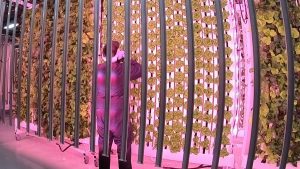[vc_row][vc_column][vc_separator color=”black”][vc_column_text]It is impossible to forget the feeling of walking into a local grocery store just a few short months ago to be met with aisle after aisle of empty shelves. A sight unseen, reminiscent of old war time stories, the effects of panic buying and blocked access to traditional supply chains shocked Canadians back into their homes empty handed. Serial entrepreneur and President of Local Leaf Farms, the new Canadian agricultural technology company that just launched the country’s first vertical farming facility, is working to ensure Canadians never face this issue again.
12 years ago, Steve Jones embarked on a journey to revolutionize Canada’s food supply system into a sustainable, locally developed industry less dependent on third party sourcing. Never did he think that when that dream came to fruition, it would be in the middle of a global pandemic. The silver lining — an overhaul of the traditional farming system had never been more apparent making industry giants and consumers finally take notice.
“Local Leaf Farms has assembled a pretty remarkable group of team members that are all focused and aligned around a single issue, which is sustainability.” says Jones, “Rarely do their [agriculture and farming companies] business models and their ESG (Environmental, Social, and Corporate Governance) plan represent a real commitment to that. When people look at our business model, we want them to take away that we are leading a conversation that emphasizes sustainability in the country and in our food supply chain.”
With a board of directors full of innovative vision, and a facility scaling plan that extends into the next 5 years, Local Leaf Farms is taking its mandate beyond the current pandemic to ensure Canadians can not only source their food locally, but can do so in a way that supports the health of the planet, reducing waste by over 80 percent.
A Start-Up Spotlight over 10 years in the making, for this week’s feature we spoke with Steve Jones of Local Leaf Farms about sustainability, what Cannabis has to do with it and what the future of agriculture in Canada will look like.[/vc_column_text][vc_text_separator title=”Q&A”][vc_column_text]
Vertical agricultural systems have been very big in the U.S. but they really haven’t broken into the Canadian market. What inspires Local Leaf Farms?


You mentioned that it has been a 12 year long journey. What has that been like and what has gone into making the company what it is now?
It took me becoming involved in several areas. I think any entrepreneur would agree that in starting a business you end up wearing a lot of hats. I was a national director at BDO (Binder Dijker Otte), at the time and in my spare time I was tracking the business model for it [hydroponic growing systems] looking at some of the input costs, the market as it stood as a way to survey people’s attitude pertaining to it.
The primary issue, and the reason it’s been a 12 year journey, is that 10 years ago most of the venture capital available was very tunnel visioned on cannabis in Canada. The timing was not right from a capital perspective or from a labor and hydro perspective, but those elements all changed over time. Then just two years ago when I was a senior partner at the BDC (Business Development Bank of Canada), I felt the time was right to finally execute on the model that I had been working on.
Entrepreneurs often want things and they want it yesterday. What I’ve learned now is that depending on the sector you’re in, you have to take a different approach and be open to a different timeline even if the overall end goal is the same.
And when it came to creating the actual growing systems themselves, was that something that you had a hands on approach? Or did you have to delegate in order to make sure that the science and the engineering matched and fit with the dream?
I wouldn’t say I have a green thumb. I’d say I have a greening thumb or something along those lines. So in no way do I or did I have any of the expertise on the agronomy and sciences behind it. In developing the model, I was looking at growing systems internationally and identified a system that had been around for a decade in the United States that checked a lot of the boxes for me to maintain our commitment to sustainability. That model allowed us to develop our farming system on a decentralized hyperlocal format that would eventually allow us to grow more than just leafy greens.
Like any scaled business, it was then about building the right board, which now has some pretty noteworthy Canadians on it, and assembling the right leadership team. But of course, to your point had to include a top notch agronomist.[/vc_column_text][vc_row_inner][vc_column_inner width=”1/2″][vc_single_image image=”19132″ img_size=”full”][/vc_column_inner][vc_column_inner width=”1/2″][vc_single_image image=”19130″ img_size=”full”][/vc_column_inner][/vc_row_inner][vc_column_text]
The company stands on three pillars; better, local and sustainable. How is this different from what we’re seeing in Canadian agriculture at the moment or what we’re seeing in terms of the traditional supply chain method currently being used?
It’s Quite different! We live in the North as a result, we’re not able to grow soil based crops on a year round basis. We do have a fairly established agricultural industry, but in no way, shape or form can not provide Canadians with the local, sustainable product that they’re looking for. So we have created a food supply chain system that is dependent upon foreign countries, predominantly Mexico and the United States. Local Leaf is able to offer a better, local and sustainable solution that grows right in our communities. We’re launching 20 of these systems by 2025 and in doing so we will be able to supply stores in a 50 kilometer radius with supply almost instantly post harvest.
Beyond the COVID-19 pandemic Local Leaf gives Canadians the assurance that their food is safe and that it is from their community. Our farms have complete traceability built into it, and it checks an awful lot of boxes for consumers in being more sustainable than typical farming systems. Our facilities use 99 percent less land and 95 percent less water and we are the first in the country to deliver our product in a plastic free completely compostable container. We’ve been able to tackle most of the challenges that traditional farming has around climate change, trade wars and pandemics so we can guarantee supply to both local retailers and directly to the consumer.
As you mentioned the COVID-19 pandemic has had quite the lasting impression on Canadians and has in many ways amplified the shortcomings of our supply chain systems. How has this change influenced demand for your company?
Consumers and quite a number of retailers have certainly paid attention to the rapidly shifting dynamics of the food supply chain during the COVID-19 pandemic. And that specifically correlates with an increase in concerns around food security. Going back to March when people were walking into the stores and seeing nothing on the shelves or very little product on the shelf, it was because there were a lot of problems getting enough product from the United States. So the pandemic in many ways has affirmed that the farming model we have is the best and most innovative way forward. By reimagining the food supply system, we are able to deliver food within hours of it being harvested and that gained a lot of attention. Never before has food in Canada been able to be grown in a controlled environment where it is not affected by climate change or external pandemics using local labor on such a scale. Retailers themselves have recognized that and are coming to ask us specifically about those sustainable elements.
Let’s talk about your career and how you’ve navigated the good with the bad. What would you say was your biggest failure and how did you come out of that to be where you are today?
I don’t see failures, I see learning opportunities. One that I have seen being a serial entrepreneur, was when I stepped out of running my own businesses and went into a national corporation as a national director of strategic developments. I learned a lot in that opportunity about how to communicate differently, how to frame strategy and how to properly pace the implementation of strategies. Entrepreneurs often want things and they want it yesterday. What I’ve learned now is that depending on the sector you’re in, you have to take a different approach and be open to a different timeline even if the overall end goal is the same.
[/vc_column_text][vc_single_image image=”19131″ img_size=”full”][vc_column_text]
That in itself is great career advice, but there’s always mentorships and relationships that help entrepreneurs get through those rough patches. What was some career advice that you got that was helpful in cultivating your career?
20 years ago in one of my former occupations, I had a Bay street financier speak with me and indicate that times were going to rapidly change because of this new thing called the internet. He said we would have to prepare to pivot at a faster rate in our careers and ambitions, and do so in a way we were not used to.
Fast forward to the future, I have a board of directors of some remarkable Canadians that have done some tremendous things. The industry has been run by raising capital, and we have reached a time, to his point, where wait times are shorter now than they have ever been. If we look at this period of time, over the past four months on a global scale we’re seeing extremely well established brands having to utterly pivot on their business models that they had otherwise taken for granted at a rate never seen before.
So I think the greatest advice is to recognize that what you’re doing today is not what you’re going to be doing perhaps two months from now or a year from now, and that is not just a result of your predicated strategic vision, but because of the rapidly changing external conditions and market factors.
What makes a successful entrepreneur?
There’s really two areas they’ll need to ask themselves about. One, do they have the mental stamina and support systems to maintain the demands of being an entrepreneur? And two, are they truly as innovative as they like to say that they are? Are they able to think through the needs of rapid strategic changes and pivoting on business models?
What impact do you want to have in your field? How would you like your company to revolutionize the agriculture industry in Canada?
I’m on a mission, as is my board and my team, to change the way we produce and distribute food in Canada. That’s going to be a legacy for all of us. The pandemic has certainly highlighted the need for it and now we’re hoping, I’m hoping, that when we look back on this time, we are able to say that we’ve changed the production, distribution and supply chain model to provide Canadians with greater food safety and greater sustainability in their food supply.
[/vc_column_text][/vc_column][/vc_row]













